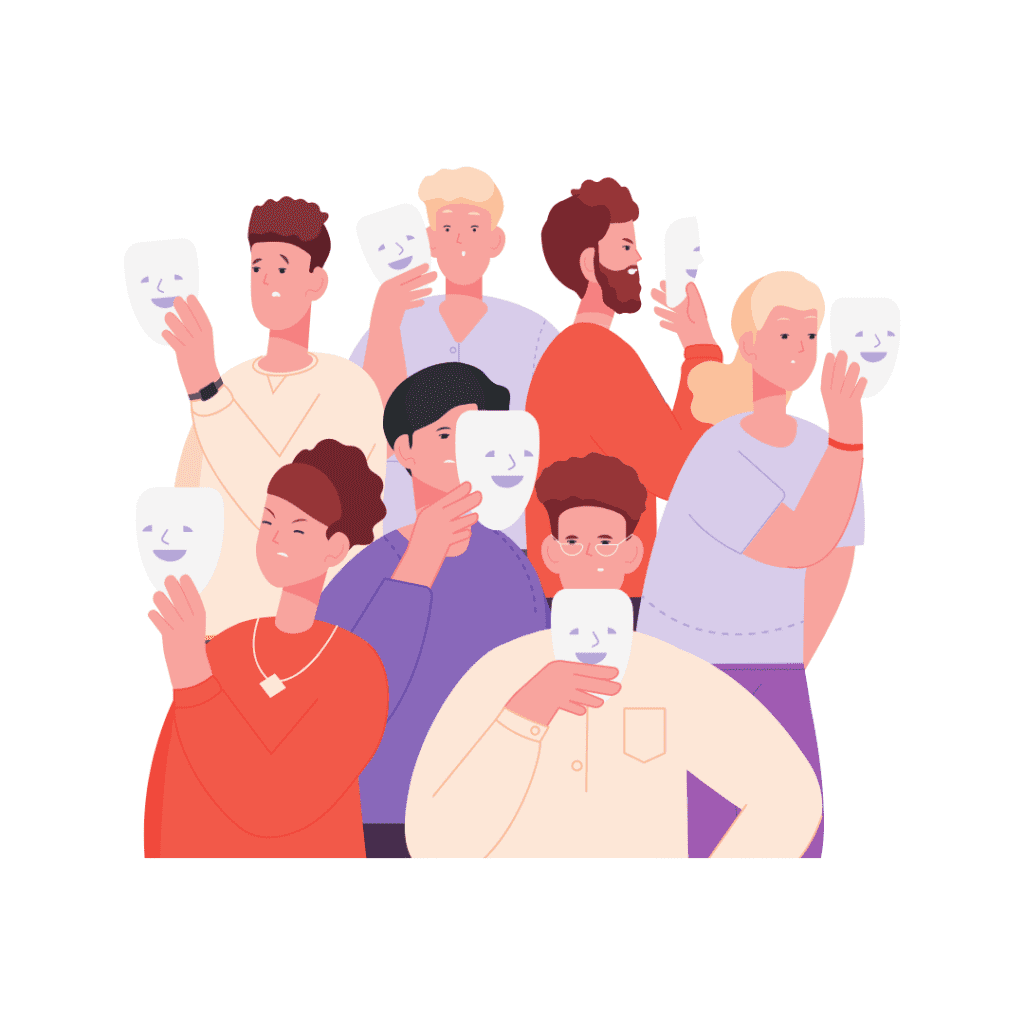Masking (also called camouflaging) is a coping mechanism that involves concealing certain traits that are a part of neurodivergence and replacing them with behaviours deemed more “socially acceptable” in order to fit into society. This behaviour may manifest as mimicking social cues, suppressing stims (repetitive behaviours often associated with autism), or adopting personas to align with what is considered ‘normal’ by society’s standards. Masking can be a survival strategy, an attempt to blend in and avoid the stigma, bullying, and exclusion that individuals within the neurodiversity spectrum, including individuals with autism, ADHD, and more, often face. Despite the seeming invisibility it offers, masking is not without consequences.
Why Some Neurodivergent People Engage in Masking Behaviours?

The Need for Acceptance
To ‘fit in,’ many neurodivergent individuals feel compelled to adopt personas that differ from their natural state. In environments where neurotypical traits are the norm, deviation can lead to isolation or discrimination. Masking, therefore, becomes a survival strategy — a way to access social acceptance.
Communication Challenges and Compensatory Strategies
Communication might pose unique challenges for some neurodivergent individuals. Navigating social cues, verbal nuances, and the subtle language of interaction can feel like a daily maze. In this context, masking becomes a learned behaviour developed through careful observation and practice to help bridge communication gaps.
Personal Safety and Avoiding Stigma
In societies where neurodiversity is poorly understood or appreciated, revealing one’s true neurodivergent self can occasionally attract unwarranted attention, misunderstanding, or even harassment. As a form of self-protection, individuals may choose to mask their characteristics to blend in more seamlessly with those around them, mitigating the risks of being stigmatized or targeted.
The Impact on Mental Health and Self-Identity
High levels of anxiety and stress
The mental health implications of masking are significant. A preference for social harmony and the avoidance of conflict, which often drives masking, can lead to prolonged stress and an inability to express one’s needs. This stance can exacerbate underlying mental health conditions or plant the seeds for future struggles, such as burnout, anxiety, and a diminished sense of self. The gap between who one is and how one presents themselves can also create feelings of isolation, disconnection, and shame.
The Risk of Burnout
The continuous effort to mask can lead to burnout, a state of emotional, physical, and mental exhaustion caused by excessive and prolonged stress. For many individuals, the constant vigilance over their words and actions, the relentless self-monitoring to ensure they align with societal expectations, can be overwhelmingly taxing. This ongoing effort drains their energy and can also take away from their ability to engage in self-care and pursue personal interests, adding to stress and leading to burnout. It’s important to recognize the early signs of burnout and seek support.
Loss of Self
The act of masking is not a static state but an ongoing process of suppression, adaptation, and performance. Yet, the slippery slope of masking may lead to individuals losing themselves in the roles they play, unable to switch ‘off’ and transition back to their authentic selves. This erosion of authenticity is a profound personal loss, as one’s true nature is often buried under the layers of performance.
Understanding one’s needs and interests
The impact of masking on neurodivergent individuals extends to a fundamental level, affecting their ability to understand their own needs and interests. Constant adaptation and suppression of one’s innate behaviours to fit into a neurotypical mould can lead to a disconnection from one’s inner self. This disassociation not only obscures a clear understanding of personal needs but also impedes the recognition and pursuit of genuine interests. Over time, the blurred boundaries between an assumed persona and the true self make it challenging for individuals to discern what truly brings them joy, satisfaction, and fulfillment, further complicating the path to personal growth and self-acceptance.
Raising Awareness and Promoting Acceptance
Acknowledging and understanding these challenges is the first step towards creating a more inclusive and understanding society. We must strive to foster environments where neurodivergent individuals can thrive without the need to mask, where their unique perspectives are valued. It’s crucial to advocate for environments that allow for the full expression of all types of minds. Acceptance, understanding, and empathy are the cornerstones upon which a truly inclusive society can be built.
Reaching Out for Support
If you or someone you know is struggling with the challenges of masking, seeking the help of mental health professionals can be a meaningful step towards understanding, managing, and thriving amidst these experiences. These experts can offer strategies and support tailored to individual needs, fostering a deeper sense of self-acceptance and well-being. We encourage anyone feeling overwhelmed by the pressures of masking to reach out for help. Remember, seeking assistance is a sign of strength and the first step towards living a more fulfilling life.
Additional Resources
The Camouflaging Autistic Traits Questionnaire (CAT-Q): This is a self-report measure of social camouflaging behaviours in adults. Developed with the intent to quantify the extent to which individuals engage in camouflaging, the CAT-Q offers insight into the personal experience of masking. This may be used to help identify autistic individuals who do not currently meet diagnostic criteria due to their ability to mask their autistic proclivities.
